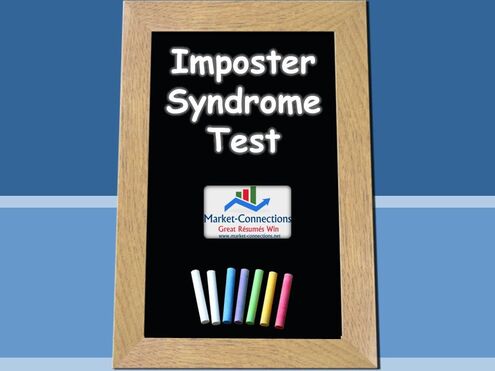The Imposter Syndrome Self-TestIt is very important that you confirm if you are experiencing imposter syndrome or not. Just having some thoughts and feelings about being an imposter now and again is not imposter syndrome. This is a natural thing that the vast majority of people experience. One of the most effective ways to confirm that someone is experiencing imposter syndrome is to ask the right questions. Dr Valerie Young identified five imposter syndrome types from her research. The information can be used as a basis for the questions. The imposter syndrome test may help overcome imposter syndrome by identifying the type of traits that someone may have related to imposter syndrome. Questions to Test for the Perfectionist ImposterA lot of people who experience imposter syndrome develop perfectionist tendencies. There are some questions that you can ask yourself to confirm whether you are a perfectionist or not. This is important and you need to answer any questions that you ask honestly. Some typical questions that you could ask yourself to test for the perfectionist imposter are:
Questions to Test for the Superhero ImposterThe superhero imposter will always accept new work even though they have a lot on at the moment. They believe that they need to work a lot harder than everyone else to prove that they are not a fraud. Here are some good questions to test for superhero imposter tendencies:
Questions to Test for the Natural Genius ImposterThe natural genius imposter is very knowledgeable in one subject only. With everything else, they are average at best. A natural genius finds it difficult to explain things and learn new things and will be devastated if their expert knowledge is called into question. These are good questions to test for the natural genius imposter:
Questions to Test for the Soloist ImposterA soloist imposter is someone that wants to work alone. This is because they do not want to be found out as a fraud. Here are some questions to ask to test for the soloist imposter:
Questions to Test for the Expert ImposterExpert imposter already knows a lot but they feel that they need to learn more. They will often want more training even though they don’t need it or will insist on performing research when this is not necessary. Ask these questions to test for expert imposter:
About the AuthorMandy Fard is a Certified Professional Resume Writer (CPRW, CMRW) and Recruiter with decades of experience in assisting job seekers, working directly with employers in multiple industries, and writing proven-effective resumes. Five Types Of ImpostersOne of the most influential people in the world of imposter syndrome is Dr Valerie Young. She has written a book on the subject which is based on her research. As a result of her research, Dr Young has also identified five distinct types of imposters. The information she provides can also be used as a basis for the Imposter Syndrome Test. This is important for you to know as it can help you to overcome imposter syndrome. The Perfectionist ImposterSome people that experience regular feelings of being a fraud will develop perfectionist tendencies. They start to believe that they need to provide proof to others that they are not an imposter and doing everything perfectly is the best way to do this. But nothing and nobody is perfect in this world so this is doomed to failure from the start. When you are a perfectionist, it will take you a lot longer to complete anything – that’s if you can complete anything at all. Perfectionists tend to go over their work time and time again and make tweaks to it each time in the name of perfection. It is always likely that a perfectionist will have many unfinished tasks because they are not satisfied with the quality of the work they have done. The Superhero ImposterThe superhero imposter is never too busy to take on more work. They are an overachiever and it is a way for them to prove that they are not a fraud. As a superhero imposter, you will work much longer hours than your colleagues. When you do finally go home, you will probably take some work with you. It is rare for a superhero to take a day off because this has no meaning to them. They have trouble focusing on one thing at a time and become a jack of all trades. A superhero is a juggler that always has a lot of balls in the air. The Natural Genius ImposterThis is a person that will be very good at one thing and distinctly average at everything else. They will be well-known for their specific talent and people will usually give them problems to solve in this area. But others will never learn anything from a natural genius imposter. This is because they have great difficulty explaining how they arrived at a solution. These people usually struggle with learning new things and often believe that they are a failure because of this. If their knowledge of the one subject was ever to let them down then this would be very difficult for the natural genius to handle. The Soloist ImposterSomeone that is a soloist imposter likes to work alone as much as possible. This is because they are terrified that someone else will find out that they are a fraud. A soloist can often be anti-social but not always. But they are always protective of their big imposter secret. The Expert ImposterThe expert imposter is very interesting. To the rest of the world, it is obvious that the person has a lot of knowledge, but to the expert they feel like they do not have enough knowledge. When they are given a task to complete, it is likely that they will insist on performing research even though they already have all of the answers. About the AuthorWMandy Fard is a Certified Professional Resume Writer (CPRW, CMRW) and Recruiter with decades of experience in assisting job seekers, working directly with employers in multiple industries, and writing proven-effective resumes. How to Handle Multiple Job OffersYou’ve interviewed with a company and things went well. The next step is to receive the job offer. In most cases, it’s a simple process — they offer you the job and you must already know how to evaluate a job offer before you accept. But sometimes there are circumstances surrounding the job offer(s) that complicate the process. So, what is a job seeker to do when more than one job offer is on the table? Here are strategies for handling the situation when multiple job offers are being considered. Multiple Job OffersQUESTION A job seeker recently asked: I’ve been interviewing for several jobs simultaneously. What if two companies offer me a job? ANSWER This is a great situation to be in! It feels wonderful to be wanted, doesn’t it? Sometimes, it’s an easy decision to make. But it can be a difficult decision if you like both companies. Of course, there are advantages and disadvantages to each job and that can help you make your decision. A “pros and cons” list can be a good way to objectively evaluate which position is the best fit. First, consider how to evaluate a job offer. Possible categories to assess can include:
A more likely scenario, however, is that you will receive one job offer before the other. So what do you do if you receive a new job offer AFTER you already accepted a job offer? New Job Offer After You Already Accepted A Job OfferQUESTION A job seeker recently asked: What do I do if I accepted a job with Company A, but Company B offered me a job after I started my new position? ANSWER If you’ve already started working at Company A, this puts you in an uncomfortable position. Your current employer has invested time and money in the hiring process, and has put resources towards training you and getting you up to speed with the company. So don’t make the decision to leave lightly. Again, assess the pros and cons of both positions. It's important to know how to evaluate a job offer. But if you are going to make a change, make it quickly. You will be burning bridges, but you don’t need to make it any more difficult than it needs to be. Offer your resignation to your new supervisor in person. Don’t put it in an email or text message. Be gracious. Thank them for this opportunity. You may even want to explain that you Are surprised to be offered your “dream” position, and it’s an opportunity that you just couldn’t pass up. Offer your two weeks’ notice (Two Weeks Notice Template), as you would if you were a long-time employee. Letting your new boss know right away also holds true if you have accepted the job at Company A, but haven’t yet reported to your first day of work. If you are going to revoke an accepted offer of employment, let the company know as soon as possible. Don’t wait to let them know — and don’t just fail to show up for your first day of work. While the company may be disappointed with your decision, the sooner you let them know you’re taking another job, the better. And what do you do if you let your current boss know you’re accepting a new position, and they tell you they don’t want to lose you? A Job Offer Counter Offer is not to be taken lightly. Be sure to look at all angles before you consider moving forward. Waiting for Job OfferQUESTION A job seeker recently asked: I’ve interviewed with two companies. I’ve been offered a job with Company A, but I want to see if I get an offer from Company B (which is the company I really want to work for). How do I handle this? ANSWER Do you have an idea of when Company B will be making a hiring decision? That can influence how you handle your response. If you’ve interviewed with both companies, and are waiting for job offer from Company B in the next 48-72 hours, you may be able to strategically “stall” Company A by requesting the offer in writing so you can review it “before accepting.” You can also take this opportunity to negotiate the offer, which may buy you some additional time. Consider the resources offered in this article: How to Negotiate Salary. Chances are you have not already discussed when to follow up after interview with Company B. So, if Company B hasn’t told you when the hiring decision will be made, you can contact the Hiring Manager and ask about a timeframe. You may even mention that you have been offered another position, but theirs is the job you really want, and you wanted to follow up to see what the timeframe is for making a decision before you let the other company know if you were going to accept their offer. However, there’s that old saying, “A bird in the hand is worth two in the bush.” You may not receive a second job offer. And if you put off Company A for too long — or don’t act “interested enough” — you may even lose that job offer. In some cases, you may be better off taking the job with Company A and then seeing what happens with Company B. Prepare your Job Offer Acceptance email. In the "Job Offer" SeriesHOW TO EVALUATE A JOB OFFER https://www.Market-Connections.net/blog/How-to-Evaluate-a-Job-Offer WAITING FOR JOB OFFER https://www.Market-Connections.net/blog/Waiting-for-Job-Offer JOB OFFER COUNTER OFFER https://www.Market-Connections.net/blog/Job-Offer-Counter-Offer CONDITIONAL EMPLOYMENT OFFER https://www.Market-Connections.net/blog/Conditional-Employment-Offer HOW TO HANDLE MULTIPLE JOB OFFERS https://www.Market-Connections.net/blog/How-to-Handle-Multiple-Job-Offers About the AuthorMandy Fard is a Certified Professional Resume Writer (CPRW, CMRW) and Recruiter with decades of experience in assisting job seekers, working directly with employers in multiple industries, and writing proven-effective resumes. Job Offer Counter OfferYou’ve interviewed with a company and things went well. The next step is to receive the job offer. In most cases, it’s a simple process — they offer you the job and you must already know how to evaluate a job offer before you accept. But sometimes there are circumstances surrounding the job offer that complicate the process. When you submit your resignation Letter (Template for Resignation Letter), your current employer may surprise you with a counter offer... Here are strategies for handling the situation when a counter offer from a current emploer is on the table. Counter Offer from Current EmployerQUESTION A job seeker recently asked: I was offered a job, but when I turned in my resignation at my current company, my boss made me a counter-offer to stay. What should I do? ANSWER This is a tricky one, because EngageScientific.com has a solid list of reasons for not accepting a counter offer. One of the reasons listed clearly states the following: "Statistics show that if you accept a counteroffer, the probability of voluntarily leaving in six (6) months, or being let go within one (1) year, is extremely high.
Many times, it’s because the employee was fired, not because they received another job offer. Moreover, there is BusinessInsider's advice in "Why You Should or Shouldn't Take the CounterOffer When Resigning" If you are in the midst of working on a key project when you get another job offer, your boss may offer you more money to stay so that the project can be completed. However, when the project ends, you may not be assigned to another key project because you’re seen as “disloyal” or a “flight risk,” or you may be asked to train other employees on your major responsibilities and tasks in case you do get offered another job — because the company doesn’t want to be caught in that same position again. From a personal perspective, there was obviously a reason why you were considering or looking for a new job. Once you have submitted a Resignation Letter (Two Weeks Notice Example), it may be too late to request to get the raise you deserve. Often, a higher salary isn’t the only reason why people accept a new job offer. Even if your current employer matches the salary offered by the new employer, the counter offer won’t address other reasons why you were considering a job change or career change. In the "Job Offer" SeriesHOW TO EVALUATE A JOB OFFER https://www.Market-Connections.net/blog/How-to-Evaluate-a-Job-Offer WAITING FOR JOB OFFER https://www.Market-Connections.net/blog/Waiting-for-Job-Offer JOB OFFER COUNTER OFFER https://www.Market-Connections.net/blog/Job-Offer-Counter-Offer CONDITIONAL EMPLOYMENT OFFER https://www.Market-Connections.net/blog/Conditional-Employment-Offer HOW TO HANDLE MULTIPLE JOB OFFERS https://www.Market-Connections.net/blog/How-to-Handle-Multiple-Job-Offers About the AuthorMandy Fard is a Certified Professional Resume Writer (CPRW, CMRW) and Recruiter with decades of experience in assisting job seekers, working directly with employers in multiple industries, and writing proven-effective resumes. Waiting for Job OfferYou’ve interviewed with a company and things went well. The next step is to receive the job offer. In most cases, it’s a simple process — they offer you the job and you must already know how to evaluate a job offer before you accept. But sometimes there are circumstances surrounding the job offer that complicate the process. When job searching, one might feel the jitters; it's "waiting for job offer anxiety"... Here are strategies for how to handle the situation when waiting for a job offer. Waiting for Job Offer AnxietyQUESTION A job seeker recently asked: I’ve been led to believe that I’m getting a job offer — the Hiring Manager talked about salary and benefits, and even showed me which office would be mine … but I haven’t heard anything from him in two weeks. Now what? Answer: There are many reasons why a job offer might be late-arriving. Most of them are out of your control. For example, the Hiring Manager might have had an unexpected project or emergency come up that delayed the job offer. Or the Human Resources Department may have had difficulty connecting with the individuals you listed as references. And sometimes, the hiring process is simply put on hold. This is why it’s important to ask in the job interview about the timeline. If the Hiring Manager says you can expect to hear back in one week, be sure to follow up after a week and ask if there is anything he or she needs from you to move the process along. If the answer is NO (they don't need anything from you to move the process along), ask if it’s okay to follow up again if you haven’t heard anything in another week. This way, you will know when to follow up after interview. By getting permission to follow-up, you don’t have to worry about imposing. But what if you didn’t ask about a timeline, or get permission to follow up? Unfortunately, sometimes you may think you’ve received positive feedback that signals that a job offer is forthcoming, and the offer never comes. In this case, the follow up call might yield the information that the position has been offered to someone else. In the "Job Offer" SeriesHOW TO EVALUATE A JOB OFFER https://www.Market-Connections.net/blog/How-to-Evaluate-a-Job-Offer WAITING FOR JOB OFFER https://www.Market-Connections.net/blog/Waiting-for-Job-Offer JOB OFFER COUNTER OFFER https://www.Market-Connections.net/blog/Job-Offer-Counter-Offer CONDITIONAL EMPLOYMENT OFFER https://www.Market-Connections.net/blog/Conditional-Employment-Offer HOW TO HANDLE MULTIPLE JOB OFFERS https://www.Market-Connections.net/blog/How-to-Handle-Multiple-Job-Offers About the AuthorMandy Fard is a Certified Professional Resume Writer (CPRW, CMRW) and Recruiter with decades of experience in assisting job seekers, working directly with employers in multiple industries, and writing proven-effective resumes. Conditional Employment OfferYou’ve interviewed with a company and things went well. The next step is to receive the job offer. In most cases, it’s a simple process — they offer you the job and you must already know how to evaluate a job offer before you accept. But sometimes there are circumstances surrounding the job offer that complicate the process. Below are strategies for job seekers to handle the situation when there is concern about a background check. Job Offer Contingent Upon Background CheckQUESTION A job seeker recently asked: I interviewed with a company yesterday and they mentioned that a background check is a standard part of their hiring process. I’m worried what a background check will reveal. What should I do? ANSWER Don’t wait until you’ve been offered the job to address significant negative issues, such as a DUI or a bankruptcy. You don’t want any issues to “surprise” the employer. If you know a background check is part of the hiring process, you will want to disclose information during the interview process (or on the application form, if it asks you about current or previous legal or financial problems); otherwise, you risk having the job offer rescinded when the background check reveals an issue. The most common reasons for not passing a background check are errors of omission, misstatements of facts, and financial and legal problems. Also, your job application is a legal document, so all information on it must be accurate. If a background check identifies a discrepancy you cannot explain, you may lose the job offer. Another important consideration is that if it's a conditional employment offer contingent on a successful background check, do not give resignation notice to your current employer until you’ve passed the background check. Otherwise, you might find yourself without a job entirely, if there is a problem with the background check at the new company, and you’ve already given your two-week notice at your current job. Let your new employer know that you will be giving your current company your resignation letter once their offer has been finalized — meaning, when you’ve cleared the background check. According to a survey conducted by the Society of Human Resource Management (SHRM), 69 percent of employers conduct a criminal background check as part of the hiring process. You will be asked to provide permission to conduct the background check, and you likely will have to sign a release form. If a conviction is revealed through a background check, the employer must consider the nature of the crime, its relevance to the proposed job, and the time that has passed since the offense. In the "Job Offer" SeriesHOW TO EVALUATE A JOB OFFER https://www.Market-Connections.net/blog/How-to-Evaluate-a-Job-Offer WAITING FOR JOB OFFER https://www.Market-Connections.net/blog/Waiting-for-Job-Offer JOB OFFER COUNTER OFFER https://www.Market-Connections.net/blog/Job-Offer-Counter-Offer CONDITIONAL EMPLOYMENT OFFER https://www.Market-Connections.net/blog/Conditional-Employment-Offer HOW TO HANDLE MULTIPLE JOB OFFERS https://www.Market-Connections.net/blog/How-to-Handle-Multiple-Job-Offers About the AuthorMandy Fard is a Certified Professional Resume Writer (CPRW, CMRW) and Recruiter with decades of experience in assisting job seekers, working directly with employers in multiple industries, and writing proven-effective resumes. |
Categories
All
powered by Surfing Waves
AuthorMandy Fard is a Certified Professional Resume Writer (CPRW, CMRW) and Recruiter with decades of experience in assisting job seekers, working directly with employers in multiple industries, and writing proven-effective resumes. Archives
July 2024
|
-
Greater Los Angeles
and Kern County
-
[email protected]
.









 RSS Feed
RSS Feed



